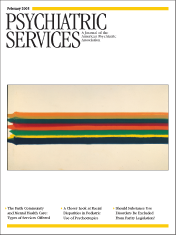Psychoneuroendocrinology: The Scientific Basis of Clinical Practice
Owen M. Wolkowitz, M.D., and Anthony J. Rothschild, M.D., both distinguished experts in the relatively new trans-specialty area of psychoneuroendocrinology, have assembled a fine encyclopedic text drawing on experts in the variety of subfields encompassed by this growing specialty. I entered this field in the 1950s by serving in junior capacities in adrenal and pituitary clinical and basic research at a time when cortisol and adrenocorticotropic hormone (ACTH) were new drugs and Addison's disease was barely treatable.
Psychoneuroendocrinology: The Scientific Basis of Clinical Practice provides an excellent basis for any trainee or junior investigator who is entering the field or reviewing it for board examinations and should be useful for the next decade. All chapters are very well written and clinically relevant—mostly to physicians and biological investigators, probably, and to social workers, many psychologists, and certainly nurse practitioners, who will also find this book a fascinating and useful background for their work.
The deficits of the book are essentially the same as those of almost all biological research in psychiatry and, I suspect, endocrinology—the fact that it is a collection of many small studies leading to interesting but tentative findings. Almost all research, unfortunately, fails to yield findings that permit clear diagnostic conclusions or clear laboratory markers that are usable in clinical therapy. Even the dexamethasone suppression test (DST) , the most widely used and studied assay, probably yields abnormal results among many patients with depression, especially those with psychotic depression, but has yet to show the specificity and sensitivity necessary to determine diagnosis and predict response to treatment.
The reader of Psychoneuroendocrinology will become well aware of the available approaches to understanding the relationships between endocrine abnormalities and psychiatric disorders. The measurable variables are steadily increasing in number and sophistication. The psychiatric symptoms and disorders associated with endocrine disorders are, unfortunately, almost as complex and varied. The reader will be fascinated by the smorgasbord of information that is presented clearly and cogently in this book.
Dr. Cole is professor of psychiatry at Harvard Medical School in Boston and senior consultant in psychopharmacology at McLean Hospital in Belmont, Massachusetts.



